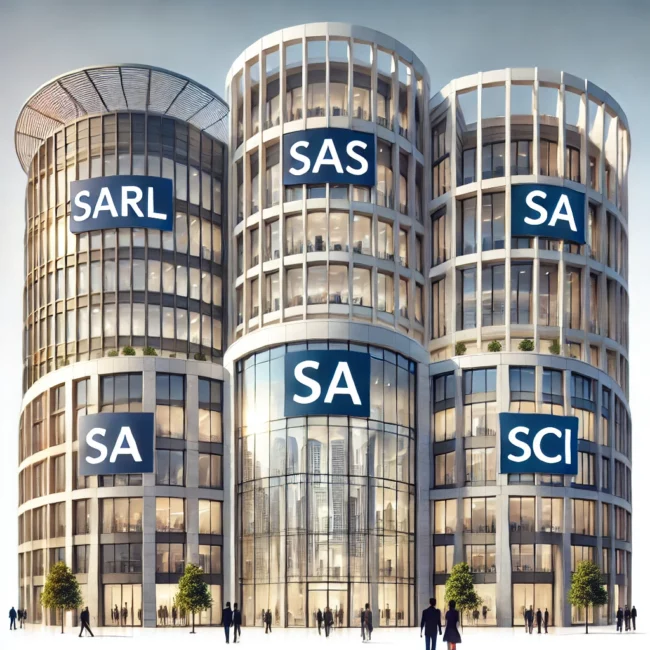When starting a business in France, selecting the right structure is crucial to ensure your company’s interests and liability are protected. With various options available, each with its own tax and social security implications, it’s essential to choose the structure that best suits your business needs.

What's the best business structure for your French venture?
The choice of business structure will depend on several factors, including the size and type of your business, the number of owners, and your personal liability preferences. Here are some of the most common business structures in France.
The choice of business structure is a critical decision that can have significant consequences for the success and sustainability of a business. – Robert Kiyosaki, Entrepreneur and Author, Rich Dad Poor Dad, 1997
Simplicity and flexibility: Sole Proprietorship (EI)
The sole proprietorship is the simplest and most popular business structure in France. It’s managed exclusively by a natural person, the sole trader, who has full powers to act. With limited liability since May 15th, 2022, this structure offers flexibility and no share capital is required. The sole trader is subject to income tax, and the business is not required to publish annual accounts. For more information on setting up a sole proprietorship in France, check out the French Business Federation’s guide (MEDEF).
Key features of Sole Proprietorship:
- Managed exclusively by a natural person, the sole trader, who has full powers to act.
- Limited liability since May 15th, 2022.
- No share capital required.
Limited liability and flexibility: Entreprise Unipersonnelle à Responsabilité Limitée (EURL)
The EURL is a type of SARL with a single partner, offering limited liability and flexible management. The partner’s liability is limited to their contributions, except in the event of mismanagement. The EURL is a popular choice for small and medium-sized businesses, as it provides a high degree of flexibility in terms of management and taxation. If you’re considering setting up an EURL, our company setting-up services can help.
Key features of EURL:
- Type of SARL with a single partner.
- Limited liability and flexible management.
Partnership and shared responsibility: Limited Liability Company (SARL)
The SARL requires at least two partners and is the most common type of company in France. The partners’ liability is limited to their contribution, and the share capital is determined by the size and needs of the company. The SARL is a popular choice for businesses that require multiple owners or investors. For more information on the tax implications of an SARL, check out our tax assistance services.
Key features of SARL:
- Requires at least two partners.
- Partners’ liability is limited to their contribution.
Large-scale projects and limited liability: Public Limited Company (SA)
The SA is suitable for large-scale projects with limited liability, requiring a minimum share capital of €37,000. It can bring together a large number of partners or shareholders. The SA is a popular choice for businesses that require significant investment and want to raise capital from the public.
Key features of SA:
- Suitable for large-scale projects with limited liability.
- Requires a minimum share capital of €37,000.
Flexibility and tax benefits: Société par Actions Simplifiée (SAS) and Société par Actions Simplifiée Unipersonnelle (SASU)
The SAS and SASU offer great flexibility in terms of capital and transfer of shares, requiring at least one shareholder. The SASU is a popular choice for small and medium-sized businesses, as it provides a high degree of flexibility in terms of management and taxation. If you’re dealing with business and commercial issues, our business and commercial issues services can provide valuable assistance.
Key features of SAS and SASU:
- Great flexibility in terms of capital and transfer of shares.
- Requires at least one shareholder.
Joint liability and shared responsibility: Société en Nom Collectif (SNC)
The SNC is less common, requiring a minimum of two partners, both of whom must be traders. The partners are jointly and severally liable for the company’s debts. The SNC is a popular choice for businesses that require multiple owners and want to share responsibility and liability. If you’re dealing with debt recovery issues, our debt recovery services can help.
Key features of SNC:
- Less common, requiring a minimum of two partners.
- Partners are jointly and severally liable for the company’s debts.
Key considerations for choosing a business structure in France
Each business structure has different tax and social security implications, so it’s essential to analyze your business project carefully. Consider the following factors when choosing a business structure:
- Liability: Consider the level of personal liability you are willing to accept.
- Taxation: Consider the tax implications of each business structure.
- Management: Consider the management structure and decision-making process.
- Capital: Consider the amount of capital required to start and maintain the business.
When it comes to selecting a business structure in France, one size does not fit all. Each business has unique needs and goals, and it’s essential to work with a trusted advisor who can provide personalized guidance and support. – Marc Timmermans, Partner, Tax/Corporate
Get expert advice on choosing the right business structure in France
At My French Lawyer, our registered lawyers are at your disposal to answer your queries and provide accurate advice on choosing the right business structure in France. Our team of experts will guide you through the process, helping you to determine the most suitable structure for your business needs. Whether you’re a start-up, a small business, or a large corporation, we’ll provide you with personalized advice and support to ensure that you make an informed decision. Contact us today to schedule a consultation with one of our experienced lawyers and take the first step towards establishing a successful business in France.